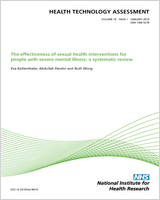Included under terms of UK Non-commercial Government License.
NCBI Bookshelf. A service of the National Library of Medicine, National Institutes of Health.
Wright B, Marshall D, Adamson J, et al. Social Stories™ to alleviate challenging behaviour and social difficulties exhibited by children with autism spectrum disorder in mainstream schools: design of a manualised training toolkit and feasibility study for a cluster randomised controlled trial with nested qualitative and cost-effectiveness components. Southampton (UK): NIHR Journals Library; 2016 Jan. (Health Technology Assessment, No. 20.6.)

Social Stories™ to alleviate challenging behaviour and social difficulties exhibited by children with autism spectrum disorder in mainstream schools: design of a manualised training toolkit and feasibility study for a cluster randomised controlled trial with nested qualitative and cost-effectiveness components.
Show detailsIntroduction
The protocol suggests that the overall aim of the focus groups is to ‘gather information relating to the optimum design and use of Social Stories in children and young people with autism spectrum disorders’.
The focus group aims include checking that the ‘intervention can feasibly be delivered in this particular context and to ensure the intervention is acceptable to users and providers’ so the following factors will be taken into consideration:
- the helpful and unhelpful parts of the social story intervention
- the characteristics of individuals best placed to deliver the intervention
- determining which professional groups are best equipped to deliver and or support this package
- mode of delivery including the role of parents or carers
- the style and content of the manual
- the construction of the social stories (for example the ratio of directive to descriptive sentences in the story, the use of pictures, etc.)
- teaching in the social story theory, and dissemination.
Further, the writing group want qualitative information which will enable them to make informed decisions about what to include in the manual.
An initial focus group will cover eight main sections based on the factors highlighted above. The amount of attendees has meant that the questions have needed consolidating. I have taken on board the landscape interviews and further suggestions of colleagues and the writing group and have created a final synthesis. There is further space in the second focus group to pick up issues that arise in the first. Questions for the second round will be written in light of analysis and discussion with the team and writing group.
The format for the focus group will be mainly discussion but I have decided to include two Post-it® (Evernote Corporation 3M, Maplewood, MN, USA) exercises. The requirements for the focus groups will be name tags for participants, pens and post it notes. A board or wall space on which to put the top three behaviours will also be required. Table 52 shows the overall questions which may be asked of teacher/clinician focus groups. Text displayed in bold are prompts.
TABLE 52
The overall questions for the teachers and clinicians focus groups
- Focus group 1 topic guide - Social Stories™ to alleviate challenging behaviour a...Focus group 1 topic guide - Social Stories™ to alleviate challenging behaviour and social difficulties exhibited by children with autism spectrum disorder in mainstream schools: design of a manualised training toolkit and feasibility study for a cluster randomised controlled trial with nested qualitative and cost-effectiveness components
Your browsing activity is empty.
Activity recording is turned off.
See more...